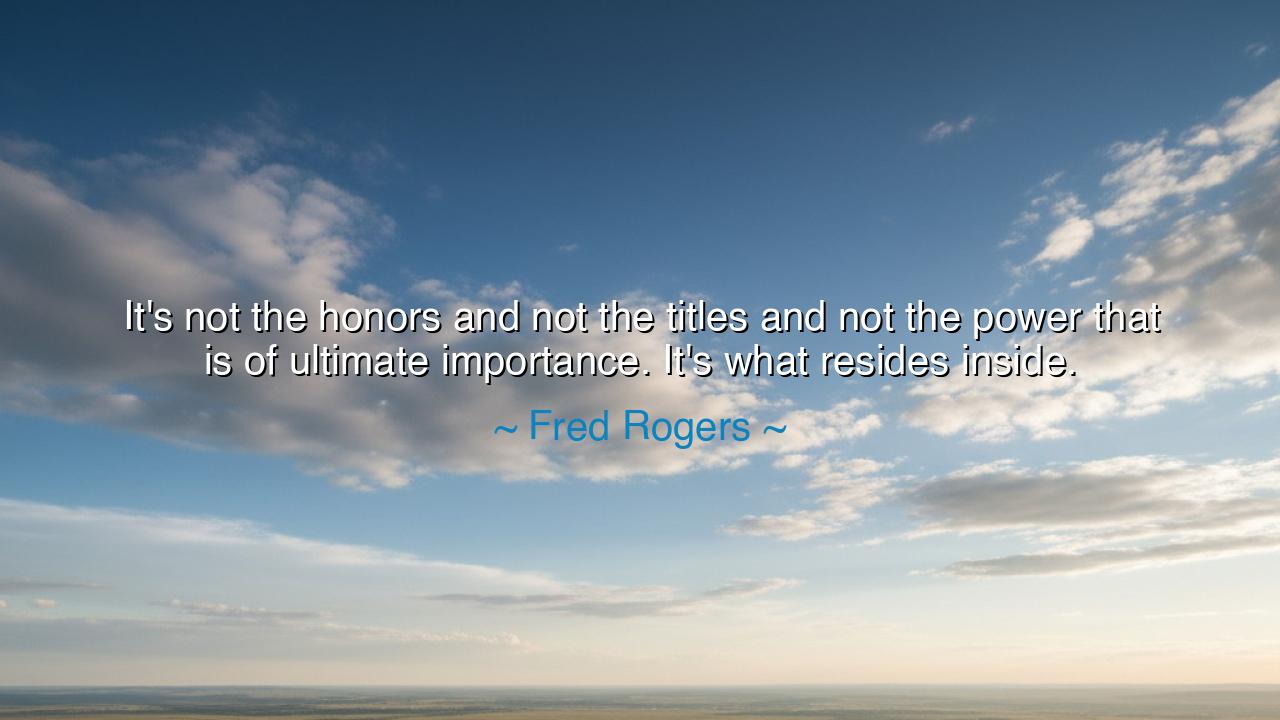
It's not the honors and not the titles and not the power that is
It's not the honors and not the titles and not the power that is of ultimate importance. It's what resides inside.






Fred Rogers, gentle teacher of hearts, proclaims that it is not honors, nor titles, nor power that hold the highest worth. These are but ornaments, fleeting and fragile, bestowed today and forgotten tomorrow. What truly endures, he reminds us, is what resides inside—the compassion, the kindness, the quiet strength of the soul. In these few words, he strips away the illusions of worldly grandeur, pointing to the eternal truth that character, not acclaim, is the measure of a life.
The ancients spoke often of this wisdom. Marcus Aurelius, crowned with the might of Rome, wrote in his Meditations that the purple robe and the laurel crown are but coverings, while the true emperor is he who governs himself with justice and humility. So too does Rogers echo this: external honors cannot shape the inner man; it is the unseen heart that defines him.
History bears witness in the life of Mother Teresa, who held no title of worldly power, no throne, no golden crown. Yet what resided within her—a flame of love for the poorest and most forgotten—made her greater than kings in the eyes of humanity. While rulers built empires that crumbled, her inner wealth of mercy built a legacy that still breathes in the lives she touched.
Contrast this with those who grasped at titles and power but were hollow within. Napoleon, though crowned emperor, found his empire reduced to ashes and his name shadowed by ambition’s ruin. His honors perished with him, for they were not rooted in inner greatness. Thus Rogers reminds us: it is not what men place upon us that endures, but what we carry within that no one can strip away.
Let the generations remember: seek not the applause of the world, but the approval of conscience. For honors fade, titles vanish, and power decays, but the treasure of the heart endures beyond death. He who tends the inner garden shall bear fruit that time cannot spoil. For it is what resides inside—truth, love, and goodness—that is the true crown of man, brighter than any laurel and stronger than any throne.






VVCuong Vu Viet
I wonder how this insight can be applied in everyday life. If internal qualities are of ultimate importance, what practices or habits help nurture them? Could mindfulness, reflection, and acts of service serve as tools for aligning one’s inner life with outward actions? I’d like to explore whether prioritizing what resides inside can influence the way we interact with others, make decisions, and define what it means to live a meaningful life.
TTNguyen Ha Thanh Truc
This quote invites reflection on the relationship between self-awareness and societal perception. How do we discern what truly resides inside, and how can we ensure that inner values are not overshadowed by the pursuit of recognition? I’m intrigued by whether the cultivation of internal qualities like empathy, kindness, and moral courage might be the foundation for a more just and compassionate society, rather than relying solely on external markers of success.
PTHoang Thi Phuong Thao
Reading this, I find myself questioning how we evaluate character versus outward success. Are people who achieve great power or recognition necessarily admirable, or is there often a disconnect between external accomplishments and inner integrity? I’d like to consider whether cultivating internal virtues can provide a form of fulfillment and stability that external accolades cannot, and how individuals can be encouraged to prioritize personal growth over societal approval.
TVTruong Thuy Vy
I’m curious about the implications of this statement for leadership and influence. Can someone wield power effectively if their inner values are misaligned with their actions? Conversely, does genuine inner strength naturally translate into positive external impact, regardless of titles or honors? I’d like to explore how internal qualities might guide ethical decision-making, and whether society adequately rewards people for cultivating what truly matters inside.
VYVy Yen
This perspective makes me reflect on how society often measures success externally rather than internally. Does valuing what resides within challenge conventional ideas of achievement? I wonder how one can cultivate inner qualities such as compassion, integrity, and resilience in a culture that prioritizes status and recognition. Could focusing on internal growth ultimately lead to more meaningful accomplishments, or is there a necessary balance between internal virtues and external achievements?